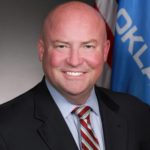By Oklahoma Institute for Child Advocacy Joe Dorman
With this new way of life, all ages face significant challenges. Adults must work from home or seek unemployment assistance. Youth must do their coursework over the Internet and with computers and, for some, miss out on major life events like prom, graduation, or programs dear to them.
As we adapt, please keep in mind this generation of young Americans is facing the most traumatic change in their short lives. We must have patience with them. It is inevitable that cases of domestic and child abuse increase when people are forced to spend more time in close proximity, so please be vigilant and report any issues which might have merit.
While brick-and-mortar schools are closed, states have turned to distance learning to keep educating students at home. If you are struggling financially, there are options which you should consider that could assist with the cost of your Internet access.
Lifeline is the federal government’s program to help make communications services more affordable for low-income consumers. Lifeline provides subscribers a discount on monthly telephone service, broadband Internet access service, or voice-broadband bundled service purchased from participating providers. Lifeline is a federal program that offers a monthly benefit of $9.25 towards phone or internet services for eligible subscribers, or of up to $34.25 for those living on Tribal/Native lands, which is most of Oklahoma.
Enhanced Lifeline benefits are available to low-income residents living in those areas even if the person is not Native American. You can find out more about which areas are eligible Tribal lands by visiting this site: https://www.lifelinesupport.org/additional-support-for-tribal-lands/
Lifeline subscribers can apply their benefit to home or mobile phone service or to high-speed broadband from your current company, so contact them to apply your Lifeline benefit to a service you are already getting. A consumer can qualify for the Lifeline benefit if their income is 135% or less than the federal poverty guidelines, or if they participate in SNAP, Medicaid, or other federal programs. Families that qualify for free and reduced lunch programs in school should also qualify for this service.
To apply for Lifeline, a consumer must use the National Verifier application system at: https://nationalverifier.service-now.com/lifeline to submit for the service. The National Verifier is a centralized system established by the Federal Communications Commission (FCC) and operated by Universal Service Administrative Company that verifies Lifeline applicants’ eligibility and recertifies subscriber eligibility annually through the Universal Services Fund.
“As Americans across the country turn to online services to enable social distancing measures, the importance of access to affordable communications, especially for low-income households, has only increased,” said FCC Chairman Ajit Pai. “During times of crisis, maintaining connections to family and friends, medical professionals and educators, and your coworkers is imperative, and I don’t want any American consumers experiencing hardships because of the pandemic to lose connectivity.”
If your family qualifies, please investigate this option. You have 45 days after you start the application to finish it. This service can certainly help more children have greater access to educational systems when it is needed the most, as well as allow many Americans the opportunity to maintain social interaction, while also keeping up social distancing.
The child statistic of the week is sponsored by Blair Naifeh and comes from the Kids Count Data Center – In 2016, 23.1% of Oklahoma children lived in poverty.



Approximately half of the students in our district live where internet is not available, regardless of price. We are a rural, hilly, area, and the population density is so low that internet providers don’t find it profitable to run their services out to us. I’m among the fortunate that has service, but a very large percentage do not have any availability, due to geography.
Or you could just enroll your kids in one of Oklahoma’s virtual charter schools, like EPIC, K12, Oklahoma Connections, etc. They have been doing “distance learning” for quite some time. Oh, and some of them will make computers and wifi hotspots available at no cost to the family – EPIC does it for everyone, the others do it for kids eligible for Free and Reduced Price Lunch.